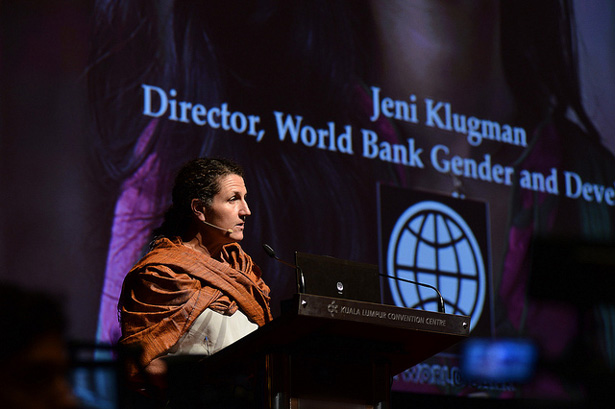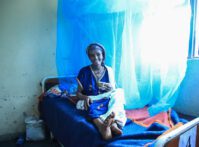-
Women: Producers, Not Just Reproducers
May 28, 2013 By Schuyler Null
A major theme on day one of the global Women Deliver conference here in Kuala Lumpur was that “women are not just reproducers, they’re producers.” That is, maternal health and other gender-related issues not only affect the lives of women, girls, and children, but help shape the economies and societies that they live in.
A new report by the World Bank, launched at the opening plenary and previewed in The Lancet, quantifies the economic power of investing in maternal health and identifies some of the most effective policies. The author, World Bank Director of Gender and Development Jeni Klugman, said they found strong cross-country evidence that high levels of maternal mortality are connected to low levels of GDP.
“Women are still the majority of the world’s poor and uneducated,” said Hillary Clinton in a taped message to the conference’s more than 4,500 participants from 149 different countries. Development interventions to reduce poverty therefore must take gender, and maternal health in particular, into account.
“Gender equality and reproductive health are inextricably linked,” said Klugman. Despite “unprecedented” narrowing of gender gaps over the last quarter century, global female labor participation has only risen one percent. “Almost 4 in 10 women have no say in their own health care,” she continued. This lack of agency – or “ability to pursue goals that one values and has reason to value,” as they put it in the paper – contributes to the disenfranchisement of women in both the political and economic spheres.
Kavita Ramdas on why educating girls is not enough “Poor maternal health is linked to lost wages, reduced productivity, and important household effects, especially via children,” said co-author Karen A. Grépin during a concurrent session. Studies have found that children often complete fewer years of schooling after the loss of their mother, for example. Grépin and Klugman also found that in Sri Lanka, parents increased their investments in their daughters’ schooling when they expected them to live longer.
Simply put, “girls are too often left out of the picture,” said Jill Sheffield, president of Women Deliver, and “today’s girls are tomorrow’s women.”
Part of the problem, said Grépin, is that when it comes to maternal health, “there’s a big gap between ‘what we know works’ and what actually works.” Many projects rely on just a handful of well-worn examples and studies, she said. More rigorous evaluation is needed to measure the actual effect of programs, build a more robust evidence base, and maximize investments.
“We have major new international initiatives,” said Peter Berman of the Harvard School of Public Health at the opening plenary, “but are we prepared with sound guidance on how this money should be spent?”
Grépin said the most effective policies include not only measures that improve the health system (where most attention has been focused to date) but also increase the accountability of health systems and related institutions and expand the agency of women and girls. Accountability and agency are beyond the normal bounds of many current maternal health interventions, she said, but expanding the audience for these messages may now be easier due to the report’s evidence connecting women’s health to economics. “We think ministers of finance should be paying attention to this,” she said.
“This paper will be quoted a lot,” said Purnima Mane, president of Pathfinder International, at the same side session. Many political commitments have been made to improve women and girls’ health – and agency too – she said, but the “the problem is in the implementation and follow-up of implementation.” While better maternal health is a moral and ethical goal in its own right, a stronger economic argument will perhaps bring more pressure to bear on governments, donors, and the private sector to follow through on their commitments. She cited Pathfinder’s SCIP project in Mozambique as an example of a cross-sectoral intervention that combines health, environment, and economic development efforts and improves accountability through close interaction with community and government leadership.
“That’s what Women Deliver should push for – implement your commitments,” said Deputy Executive Director of UN Women Lakshmi Puri. “There are so many examples of the connection between women’s political and economic empowerment and women’s health.”
Musimbi Kanyoro, president of the Global Fund for Women, said during the opening plenary that she is worried that too many maternal health efforts are thinking small – focusing on pilot projects that may be of academic interest but cannot be scaled up and therefore have little impact on women’s lives.
Grépin and Klugman’s work may perhaps help catalyze larger investments and more rigorous research – and it wouldn’t be a moment too soon. “Treating maternal health as anything short of a humanitarian emergency is an injustice,” Kanyoro said. “And justice delayed is justice denied.”
Read the Global Health Initiative’s full coverage from Women Deliver, part of our Advancing Dialogue on Maternal Health series with the Maternal Health Task Force and UNFPA.
Photo Credit: Jeni Klugman presenting at the plenary, courtesy of Women Deliver.
 A Publication of the Stimson Center.
A Publication of the Stimson Center.







